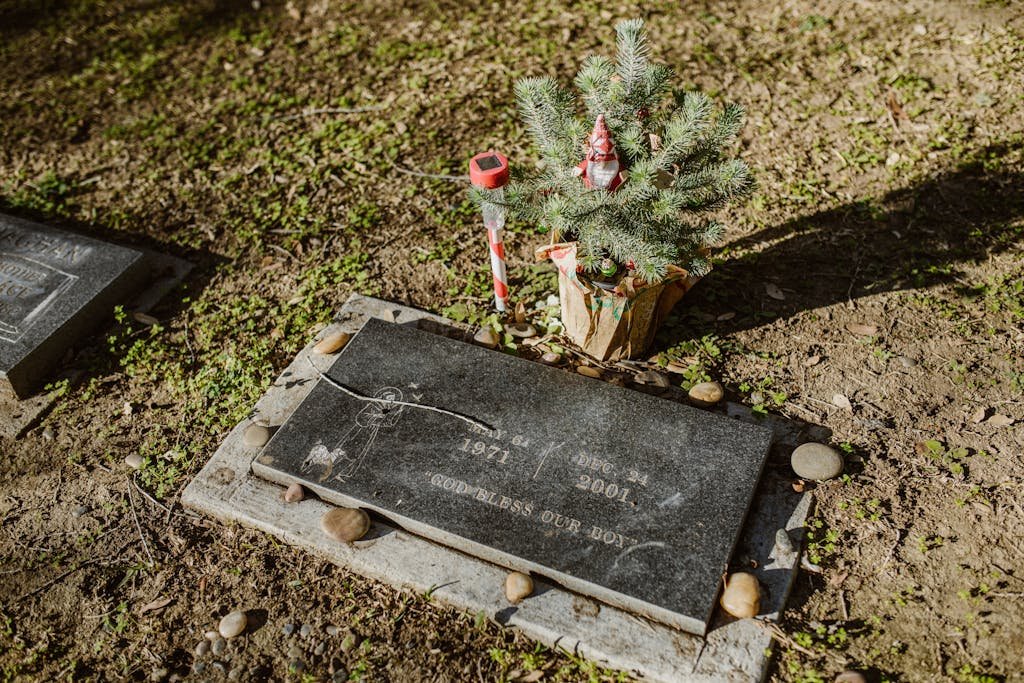Can You Use Vinegar to Clean Headstones?

Cleaning a gravestone might seem simple, but using the wrong products—like vinegar—can permanently damage the stone. Vinegar is a popular household cleaner, but when it comes to headstone cleaning, it poses serious risks.
This article explains why vinegar should be avoided, how it affects various types of stone, and what safer alternatives are recommended by experts and cemeteries.
Why People Use Vinegar on Headstones
Many DIY cleaning guides recommend vinegar because it’s natural, non-toxic, and effective at breaking down mineral deposits. While that may work on bathroom tiles or windows, gravestones are another story.
Most gravestones are made from porous materials like marble, sandstone, or granite. These materials are sensitive to acidic substances—including vinegar.
What Vinegar Does to Gravestones
Vinegar is acidic (typically with a pH of around 2.5). When applied to headstones, especially older or softer ones, it can cause:
- Etching or pitting of the surface
- Faded or smeared inscriptions
- Accelerated erosion
- Residue that traps moisture
- Staining over time
The damage isn’t always visible immediately, but over time, the surface will degrade and become more prone to biological growth.
Why It’s Especially Harmful to Marble and Sandstone
Marble and sandstone are particularly vulnerable to acids. These stones contain calcium carbonate, which reacts with acid by breaking down and releasing carbon dioxide. The result is permanent loss of stone material—like wearing down the very text and carving you’re trying to preserve.
Granite is more resilient, but repeated exposure to vinegar can still cause surface dulling and increase porosity, especially in polished monuments.
Approved Alternatives to Vinegar for Headstone Cleaning
If you’re trying to clean a grave marker, especially in a historic or family cemetery, stick to government-approved and industry-recommended methods:
Safe Gravestone Cleaners:
- D/2 Biological Solution – Recommended by the National Cemetery Administration; removes mold, algae, and lichen safely.
- Orvus WA Paste – A gentle, pH-neutral cleaner used in museum conservation.
- Distilled Water + Soft Brush – Safe for all stone types and often all that’s needed for light cleaning.
Never use household cleaning sprays, bleach, ammonia, or vinegar. These are too harsh for porous stone surfaces.
Proper Cleaning Technique (Without Vinegar)
If you want to clean a headstone properly:
- Soak the stone with clean water – This helps loosen dirt and prevent absorption of cleaner.
- Apply a pH-neutral solution – Use D/2 or distilled water.
- Gently scrub with a soft-bristle brush – Avoid metal or stiff brushes.
- Rinse thoroughly with water – To remove residue and debris.
- Let it air dry naturally – Never use blow dryers or towels on older stones.
Cemeteries and Regulations
Many cemeteries ban the use of vinegar and other acidic cleaners outright. Using vinegar can result in fines, removal of cleaning privileges, or permanent damage to a family plot.
If you’re unsure about a cemetery’s policy, contact the groundskeeper or management before cleaning. When in doubt, hire a professional who uses methods approved by the National Park Service or National Cemetery Administration.
Final Thoughts
While vinegar may seem like a harmless, natural solution, it’s far too acidic for safe gravestone maintenance. Even a single cleaning with vinegar can permanently damage soft stones like marble. For anyone wanting to preserve a loved one’s memorial long-term, avoid shortcuts and follow preservation-safe methods using the right cleaners and tools.
FAQ: Headstone Cleaning Products and Safety
What happens if I already used vinegar on a headstone?
If vinegar has been used once, rinse the stone thoroughly with clean water. If the stone shows signs of pitting or discoloration, stop all further cleaning and consult a professional. Repeated use causes the most damage.
Is vinegar ever safe to use on granite headstones?
No. While granite is harder, vinegar can still cause surface dulling and damage over time. It’s best to use pH-neutral alternatives even for granite markers.
Why do some DIY blogs recommend vinegar for gravestones?
Many DIY sources confuse household cleaning with monument preservation. Just because vinegar is effective on kitchen counters doesn’t mean it’s safe for porous stone.
Can vinegar remove biological growth from gravestones?
It might kill some surface growth, but it also damages the stone and leaves behind acidic residue. A product like D/2 Biological Solution is much safer and more effective.
